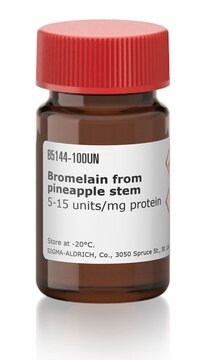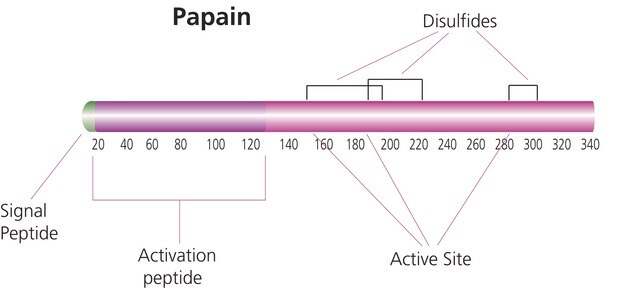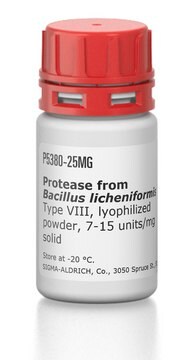B4882
Bromelain from pineapple stem
≥3 units/mg protein
About This Item
Recommended Products
form
lyophilized powder
specific activity
≥3 units/mg protein
composition
Protein, ≥30% biuret
storage temp.
−20°C
Looking for similar products? Visit Product Comparison Guide
Application
- to evaluate the aqueous micellar two-phase systems composed of ionic liquids as co-surfactants
- as a positive control in sodium dodecyl sulfate (SDS) / polyacrylamide gel electrophoresis (PAGE) and in cells proliferation assay
- to study its potential analgesic effect and to evaluate its hydrolyzingeffects on proenkephalin (PENK)-derived peptides containing enkephalin sequences
Biochem/physiol Actions
Unit Definition
Preparation Note
inhibitor
substrate
Signal Word
Danger
Hazard Statements
Precautionary Statements
Hazard Classifications
Eye Irrit. 2 - Resp. Sens. 1 - Skin Irrit. 2 - STOT SE 3
Target Organs
Respiratory system
Storage Class Code
11 - Combustible Solids
WGK
WGK 3
Flash Point(F)
Not applicable
Flash Point(C)
Not applicable
Regulatory Listings
Regulatory Listings are mainly provided for chemical products. Only limited information can be provided here for non-chemical products. No entry means none of the components are listed. It is the user’s obligation to ensure the safe and legal use of the product.
JAN Code
B4882-100G:
B4882-25G:
B4882-BULK:
B4882-1KG:
B4882-10G:
B4882-VAR:
B4882-500G:
Choose from one of the most recent versions:
Already Own This Product?
Find documentation for the products that you have recently purchased in the Document Library.
Customers Also Viewed
Protocols
Our team of scientists has experience in all areas of research including Life Science, Material Science, Chemical Synthesis, Chromatography, Analytical and many others.
Contact Technical Service









